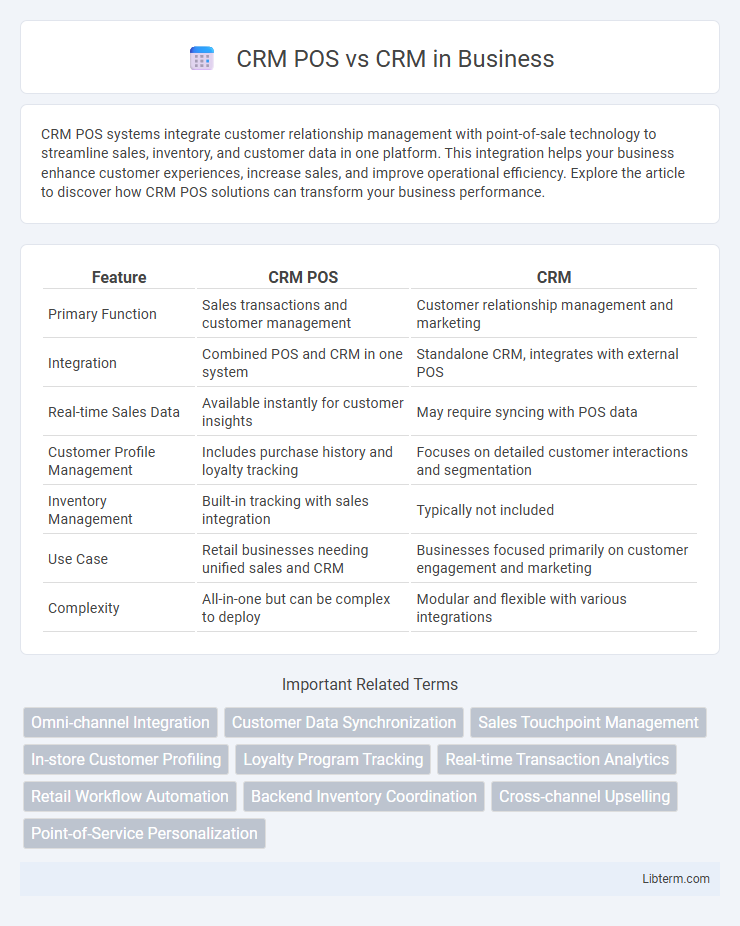CRM POS systems integrate customer relationship management with point-of-sale technology to streamline sales, inventory, and customer data in one platform. This integration helps your business enhance customer experiences, increase sales, and improve operational efficiency. Explore the article to discover how CRM POS solutions can transform your business performance.
Table of Comparison
| Feature | CRM POS | CRM |
|---|---|---|
| Primary Function | Sales transactions and customer management | Customer relationship management and marketing |
| Integration | Combined POS and CRM in one system | Standalone CRM, integrates with external POS |
| Real-time Sales Data | Available instantly for customer insights | May require syncing with POS data |
| Customer Profile Management | Includes purchase history and loyalty tracking | Focuses on detailed customer interactions and segmentation |
| Inventory Management | Built-in tracking with sales integration | Typically not included |
| Use Case | Retail businesses needing unified sales and CRM | Businesses focused primarily on customer engagement and marketing |
| Complexity | All-in-one but can be complex to deploy | Modular and flexible with various integrations |
Understanding CRM POS vs Traditional CRM
CRM POS integrates customer relationship management with point-of-sale systems, enabling real-time data collection during transactions to enhance customer insights and personalized marketing. Traditional CRM focuses primarily on managing customer interactions and data across various channels without direct integration into sales processes. The seamless connection between CRM POS and sales operations offers businesses improved inventory management, customer loyalty tracking, and targeted promotional strategies.
Key Features of CRM POS Systems
CRM POS systems integrate customer relationship management with point-of-sale functionality, enabling businesses to track sales transactions and customer interactions in real time. Key features include unified customer profiles, purchase history analysis, loyalty program management, and inventory control, enhancing personalized marketing and operational efficiency. These systems also offer seamless data synchronization across sales channels, empowering businesses to optimize customer engagement and streamline sales processes.
Core Functions of Standard CRM Software
Standard CRM software primarily focuses on managing customer relationships, including contact management, sales automation, and customer support. It centralizes customer data, tracks interactions, and analyzes customer behavior to enhance sales strategies and improve service quality. Unlike CRM POS systems, which integrate point-of-sale transactions with CRM features, core CRM software emphasizes customer lifecycle management without direct sales processing capabilities.
Integration Capabilities: CRM POS vs CRM
CRM POS systems offer seamless integration with point-of-sale hardware, enabling real-time sales data syncing and inventory management, which enhances customer insights and operational efficiency. Traditional CRM platforms excel in integrating diverse marketing, sales, and customer service tools but often lack direct connection to physical sales terminals. Businesses aiming for comprehensive customer relationship management with synchronized sales and inventory data benefit most from CRM POS integration capabilities.
Customer Data Management: Differences Explained
CRM POS integrates customer data management directly within point-of-sale systems, enabling real-time capture of purchase history, preferences, and behavior at the transaction level. Traditional CRM platforms centralize broader customer information, including interactions, support tickets, marketing engagement, and sales pipelines, supporting comprehensive relationship management beyond sales. The key difference lies in CRM POS's focus on transactional data connected to in-store or digital purchases, while standard CRM offers holistic customer profiles for multi-channel engagement and long-term strategy.
Sales and Transaction Tracking Comparison
CRM POS systems integrate customer relationship management with point-of-sale capabilities, enabling real-time sales and transaction tracking that enhances accuracy and speeds up checkouts. Traditional CRM primarily focuses on managing customer interactions and sales pipelines but lacks direct transaction processing, requiring separate POS tools for detailed sales data. Combining CRM with POS streamlines sales tracking, inventory management, and customer purchase history, providing comprehensive insights for sales optimization and personalized marketing.
Real-Time Analytics and Reporting
CRM POS systems enhance customer relationship management by integrating point-of-sale data, enabling real-time analytics that provide immediate insights into sales trends and customer behavior. Unlike traditional CRM, CRM POS offers dynamic reporting dashboards that update instantly with every transaction, facilitating faster decision-making and personalized marketing strategies. Real-time data synchronization between CRM and POS systems improves inventory management, customer segmentation, and promotional effectiveness through accurate, up-to-date information.
Industry Use Cases: Retail, F&B, and Beyond
CRM POS integrates customer relationship management with point-of-sale systems, streamlining sales tracking and personalized marketing in retail environments where real-time inventory and customer data drive sales strategies. In the food and beverage industry, CRM POS enhances customer experience by managing loyalty programs, order history, and personalized promotions directly at the point of sale, improving operational efficiency and customer retention. Beyond retail and F&B, CRM POS solutions support industries like hospitality and services by combining transactional data with customer insights to optimize service delivery and targeted engagement.
Pros and Cons of CRM POS and CRM
CRM POS integrates customer relationship management directly with point-of-sale systems, streamlining sales data and customer insights for real-time marketing and personalized service. Its pros include improved transaction tracking and enhanced customer experience, while cons involve higher implementation costs and potential system complexity. Traditional CRM excels in robust customer data management and multi-channel engagement but may lack immediate sales interface integration and real-time transaction data analysis.
Choosing the Right Solution for Your Business
Choosing the right solution between CRM POS and traditional CRM depends on your business needs and customer interaction points. CRM POS integrates sales transaction data with customer relationship management, offering real-time purchase insights and enhancing personalized marketing for retail or hospitality businesses. Traditional CRM focuses more on managing customer interactions and data across various channels, ideal for service-oriented companies emphasizing customer support and long-term engagement.
CRM POS Infographic

 libterm.com
libterm.com